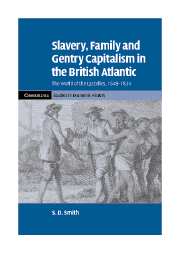 Slavery, Family, and Gentry Capitalism in the British Atlantic
Slavery, Family, and Gentry Capitalism in the British Atlantic Book contents
- Frontmatter
- Contents
- List of Figures
- List of Maps
- List of Tables
- Preface
- List of Abbreviations
- Map 1 Major trade routes of the British Atlantic
- 1 Introduction: Remembering and Forgetting
- 2 Halls and Vassalls
- 3 Rise of the Lascelles
- 4 Lascelles and Maxwell
- 5 The Gedney Clarkes
- 6 Merchants and Planters
- 7 A Labyrinth of Debt
- 8 Managing a West India Interest
- 9 The Enslaved Population
- 10 Between Black and White
- 11 Epilogue
- Archival Sources
- Index
11 - Epilogue
Published online by Cambridge University Press: 17 July 2009
- Frontmatter
- Contents
- List of Figures
- List of Maps
- List of Tables
- Preface
- List of Abbreviations
- Map 1 Major trade routes of the British Atlantic
- 1 Introduction: Remembering and Forgetting
- 2 Halls and Vassalls
- 3 Rise of the Lascelles
- 4 Lascelles and Maxwell
- 5 The Gedney Clarkes
- 6 Merchants and Planters
- 7 A Labyrinth of Debt
- 8 Managing a West India Interest
- 9 The Enslaved Population
- 10 Between Black and White
- 11 Epilogue
- Archival Sources
- Index
Summary
The Act of Emancipation brings this book to a close, yet the Lascelles' association with the Caribbean extended far beyond 1833. Indeed, the history of this Yorkshire family's connection with the West Indies is still developing, as the revival of interest in slavery at Harewood House demonstrates. A hiatus in the surviving records hinders detailed discussion of the Barbadian estates during the second half of the nineteenth century and afterwards. The following notes, however, illustrate some of the many changes that occurred in the later operation of the plantations.
The adoption of steam power suggests that the Lascelles continued to maintain and invest in their remaining sugar estates. By 1887, a 16 hp steam engine operated on Belle and a second engine of unknown generating capacity supplemented wind power on Thicket and Fortescue. For the time being, Mount's sole energy source remained a horizontal windmill; by 1913, however, it too employed a steam manager.
As late as the First World War (1914–18), the Earls of Harewood retained ownership of the four Barbadian estates. At the conclusion of the war, however, the 5th Earl sold Thicket and Fortescue. The reasons for the sale are not recorded, but wartime disruption to trade and pessimism about future returns were most likely responsible for the decision. At the same time, Belle and Mount were devised to the Earl's younger son, Major Edward Lascelles, and his heirs for life.
- Type
- Chapter
- Information
- Slavery, Family, and Gentry Capitalism in the British AtlanticThe World of the Lascelles, 1648–1834, pp. 351 - 358Publisher: Cambridge University PressPrint publication year: 2006


